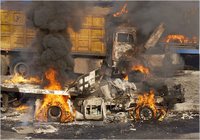A New Transatlantic Gulf?
 Since the beginning of 2005, there has been a fair degree of harmony in trans-Atlantic relations.
Since the beginning of 2005, there has been a fair degree of harmony in trans-Atlantic relations.With the Iraq war a fact of the past, there was a coming together of the different perspectives on the Middle East conflict.
Yasser Arafat was gone, there was a road map in place, the White House talked about a two-state solution and democracy was the catchword for the transformation towards peace and stability.
It all sounded pretty good. And it worked for a while.
But now there is the risk of a serious rift opening up. There is little doubt that attitudes to the ongoing conflicts are very different in the US and Europe, and the longer the fighting goes on, the deeper will that rift become.
An interesting article in Washington Post today elaborates on the distinct US reluctance to enter into anything that could lead to a "premature peace".
President Bush believes that the Israeli Air Force can inflict a significant defeat on Hezbollah, thus creating better conditions for a stable Lebanonm and ultimately reducing the influence of Iran in the region. That's the theory.
But most Europeans would consider this a pipe-dream. And one which could well have dangereous consequences. Obviously, this is also the view of UN Secretary General Kofi Annan and his experts after their tour in the region.
After eight days of intense artillery bombardment of the South of Lebanon and heavy air strikes against also infrastructure targets all over Lebanon there are no real signs of Hezbollag being significantly weakened.
The fact that they can still send their more long-range rockets against Haifa is rather remarkable - obviously Israeli intelligence has not been able to locate their basing areas and rocket stockpiles. That the more short-range Katusha's are continuing is less surprising - there are likely to be a far larger number of these, and their size make them less difficult to hide.
In the meantime, the civilian consequences of the onslaught get worse and worse.
UN now estimates that app 500 000 people have been forced to flee inside Lebanon. There are now signs - according to Haaretz - that the IDF is starting a policy of deliberate cleansing of the southernmost parts of Lebanon. It might be that one wants to creata security zone of death and destruction by driving the civilian population away.
But with attacks against bridges and roads, all of the population of Lebanon is affected. Reports talk about increasing difficulties in getting food and fuel in all parts of the country.
Washington might believe that all of this will defeat Hezbollah and create democracy in Lebanon.
But all experience from this as well as other conflicts make it far more likely that it will strengthen the political position of Hezbollah and other militant organisations both in Lebanon and throughout the Arab and Muslim world. There will be more rather fewer people listening to the messages of hate coming out of Teheran
And this is where perspectives in Washington and Brussels are now very much different.
While the former might hope that more of this war will lead to more peace, most Europeans are firm in their fear that more of war will in fight produce even more of war.


<< Home